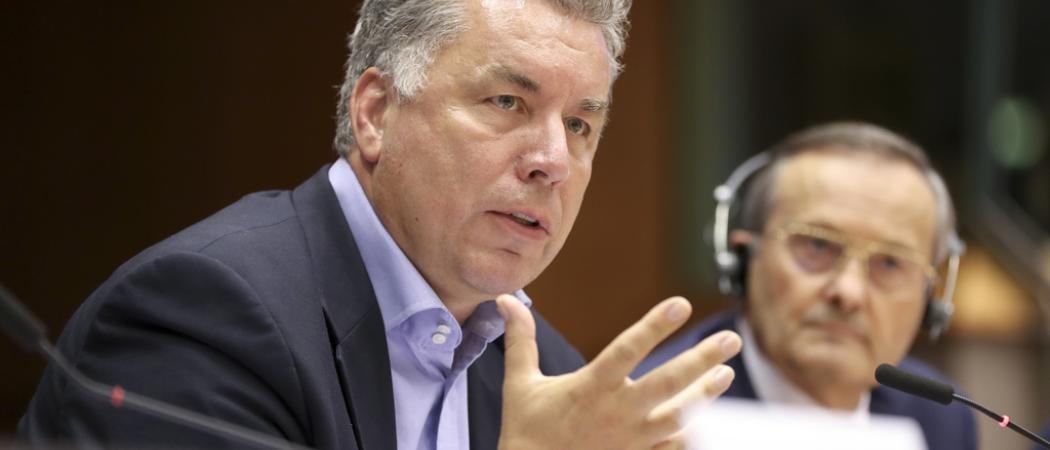Parliament’s rapporteurs seeking a ‘gentleman’s agreement’ with the EU Council – but ‘we haven’t found the second gentleman yet’

Horizon Europe rapporteur, MEP Christian Ehler. Photo: European Union
The European Parliament stepped up pressure for a preliminary deal on Horizon Europe, the European Union’s planned €94.1 billion research and innovation programme.
A pair of MEPs handling the draft legislation said they presented the EU Council’s Romanian presidency with a raft of concessions and demands, in their latest negotiating session 7 March. They said their aim is to break the political stalemate over the programme, in hopes of a deal when they meet again on 14 March.
The proposal, which they did not publish, was put together by MEPs Christian Ehler of Germany and Dan Nica of Romania, the Horizon rapporteurs.
The negotiators are striving to reach agreement on the basic structure of Horizon Europe before Parliament is dissolved for the May elections, so that the Commission has time to prepare the complex programme’s start in 2021.
Real negotiations yet to begin
While there is zero possibility of an agreement among member states on all aspects of Horizon Europe before the May elections, the Council can adopt a “partial general approach” that allows the Council Presidency – currently held by Romania – to enter “trilogue” negotiations with the Parliament and Commission on key areas of the legislation.
In theory, that would allow enough of an agreement for the Commission to begin the ground work, while other matters — such as the budget — can be settled after the new Parliament and a new Commission take office later this year.
In practice, the four trilogue meetings they have had so far have seen little serious negotiation on the substantive issues, according to Ehler. But, in an interview, he expressed optimism that “the ingredients for actually starting the negotiations and trying to strike a deal are there.”
A Council spokeswoman said that the Presidency “took a positive general view” of the new proposals but couldn’t say yes or no to any of them without asking the EU Council for a new mandate. Member states’ EU ambassadors are due to meet on 8 and 13 March, with the next big negotiating session to be held in Strasbourg on the 14 March.
Finding the other gentleman
At issue is a tussle among the three negotiating sides over which of them gets to control the action in Horizon Europe. There are two draft laws underpinning Horizon Europe: the Specific Programme that spells out much of the substance of the programme, and the Framework Programme that provides the overall authorisation and structure. Member states want to change how the Specific Programme is anchored in the EU treaties so that they get exclusive control over the operating details of Horizon Europe, without it having to go to a vote in Parliament.
Nica and Ehler – Parliament’s rapporteurs for the Framework Programme and the Specific Programme, respectively – have been trying to solve the dispute with what Ehler calls a “gentleman’s agreement,” whereby Parliament will relinquish its control over the Specific Programme if the Council agrees to include various Parliamentary amendments.
The problem is “we haven’t found the second gentleman yet,” said Ehler. If the Council won’t play ball, Parliament can refuse to pass the Framework Programme.
More money for Eastern researchers
Today’s proposals would give member states control over key strategic planning decisions, in exchange for various concessions from the Council, such as giving Parliament a deciding vote on the “mission areas,” which are the broad topics for research missions targeting specific problems – cancer, for example.
Although member states last month reached an agreement on the vague outlines of the mission areas, they continued to argue over the details.
The proposed compromise would also require member states to agree to add an additional 25 per cent on top of all payments made for personnel costs in the so-called “widening” countries like Hungary and Romania. The idea is to narrow the earnings gap between researchers in Eastern and Western Europe, although it would also increase disparities between higher and lower-paid researchers working in Eastern Europe.





 A unique international forum for public research organisations and companies to connect their external engagement with strategic interests around their R&D system.
A unique international forum for public research organisations and companies to connect their external engagement with strategic interests around their R&D system.